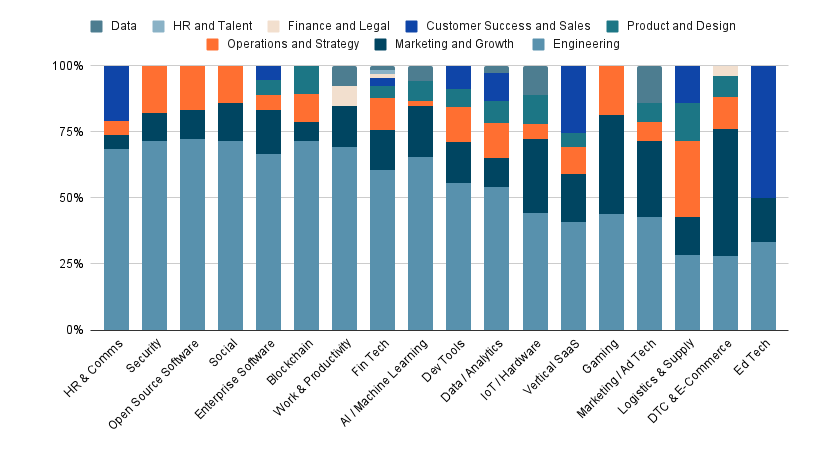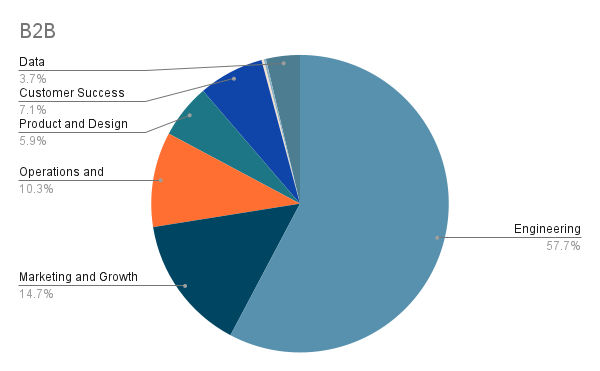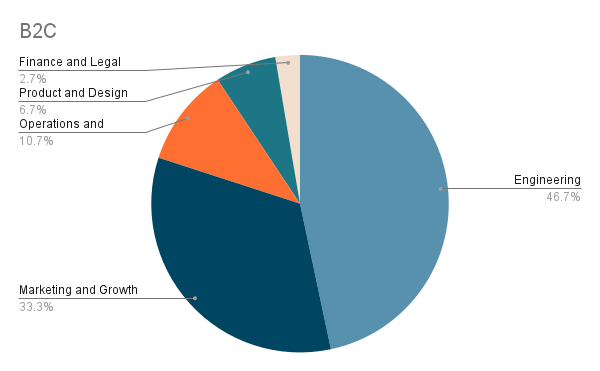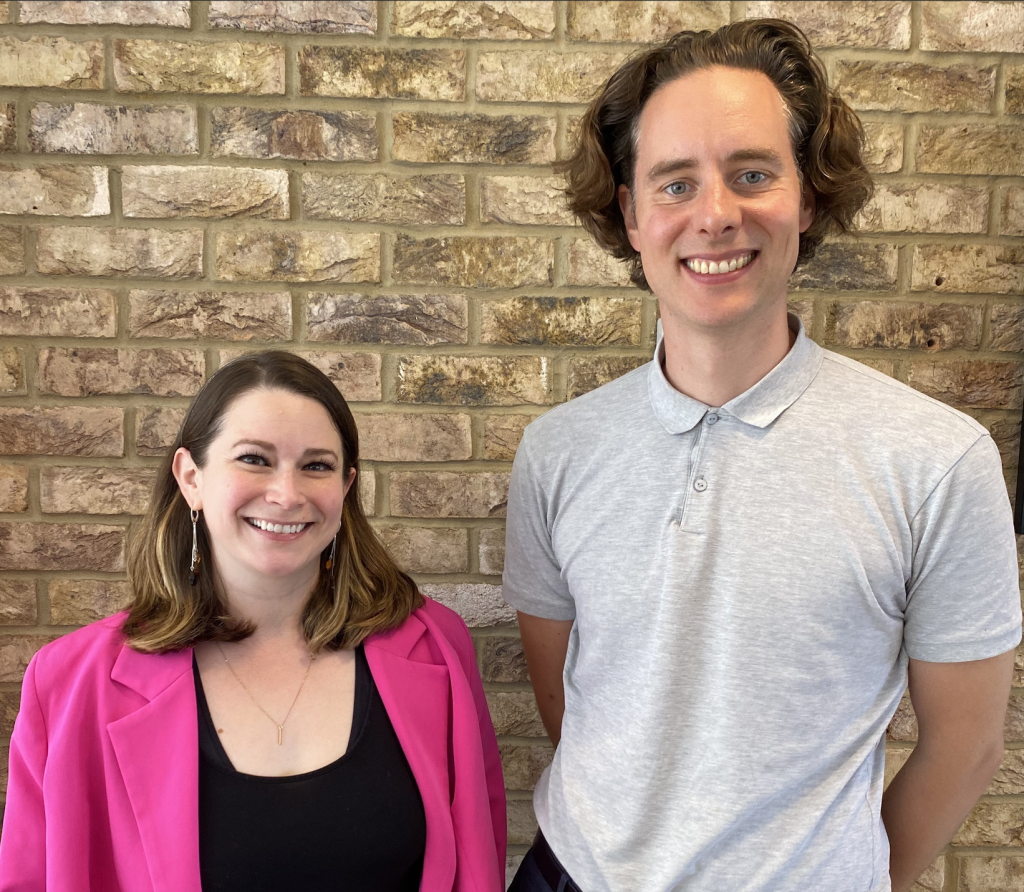Hiring the right people is one of the most important components of company-building, especially at the earliest stages. However, deciding who to hire and which roles to prioritise is easier said than done.
In this piece, we have mapped out the hiring decisions made by 60 Seedcamp-backed companies with less than 20 employees. These companies are all pre-Series A and although the dataset doesn’t spit out any ‘right answers’ about who to hire, it surfaces lots of interesting correlations.
Inspired by Lenny Rachitsky’s article about the order of early hires at breakout B2B companies, we tackle hiring from a different angle, focusing on the hiring patterns driven by sector and distribution channel.

Engineering is the most important role among the first 20 hires by a significant distance. Across most sectors, engineers comprise over 50% of the first 20 hires and in several sectors, engineers comprise closer to 75%. In categories with a lower engineering contingent, such as Gaming, E-Commerce and Ed Tech, design and marketing functions tend to eat into engineering as a result of the intense competition for eyeballs on the end-user experience.
Data hires are most obviously critical for cases where the core product involves interaction with company or user data (e.g. ad tech, ML, AI). Data engineers also tend to be more important for companies where product-market-fit can be an exercise in fine margins (e.g. enterprise, productivity). Understanding user interactions with the product and making minute adjustments to UX choices can unlock big retention gains.
Customer Success and Sales hiring seems to depend more on the typical sales cycle for the product. Highly complex deals with large enterprise customers require a sales-led motion and strong post-sales support. Whereas security and OSS (open source software) tools don’t necessarily have ‘end users’ within the enterprise and require limited non-engineering customer support, vertical or HR software is likely to have several features for different users working in different parts of a business. For example, an HR suite could be used by different teams for performance management, onboarding and hiring.
Marketing. Most companies seem to need an early marketing hire in one way or another. The data emphasises sectors that are hotly competed by lots of adjacent companies (e.g. enterprise software) are competing for eyeballs (e.g. gaming), or might have a more extended user education curve (e.g. IoT).
Product hiring trends are harder to derive from the data. Often one of the founders will be the business’ de facto product leader through the early stages of growth. As a result, until the engineering team reaches a critical mass, a PM is typically less vital to the team. This is especially the case while there is minimal data with which product decisions can be made. That said, the crossroads of scaling product is very founder-specific .If the founding team are required in other areas of the business, the first PM is a critical hire.
Operations are not totally dissimilar and depend largely on the specific components of the business. For many software companies, there simply aren’t many operational considerations early on. Whereas some businesses have operational complexity in the physical world embedded at their core, such as a food delivery marketplace or a solar financing business, the majority do not.
B2B vs. B2C Companies

For B2B companies, engineering contributes the lion’s share of employees. Start-ups are increasingly being born into a world where MVPs need to look and feel like the finished product, before considering hiring a flock of sales people. This requires a lot of engineering up front as ‘building in public’ continues to become less popular.

You will notice that for B2C companies, the allocation of hiring to Marketing and Growth is much larger, at the expense of Engineering.
It used to be a consensus that a consumer needed to be reached by marketing 7 times before making a purchase. That number is probably now far higher with the saturation and competition of ‘sexy’ consumer brands on social media.
According to Chamath Palihapitiya in a now-deleted Social Capital shareholder letter from 2018, “Startups spend almost 40 cents of every VC dollar on Google, Facebook, and Amazon”. Although this may well be overstated, marketing spend is clearly key to many B2C winners. Duolingo for example continues to outspend competitors on performance marketing by 5x.
B2C companies have a very similar portion of operations and strategy employees to B2B companies and do not require customer success and sales execs that guide through heavy duty contracts.
Variety and Deviation
This data is all well and good but doesn’t necessarily show the strength of correlation within each of these hiring categories, which varies considerably.







If you have thoughts and opinions on hiring in early-stage tech companies, we’d love to hear them! Alternatively, if you are interested in a role, join the newly-launched Seedcamp Talent Network.
Notes on the data
This post was written by Will Bennett, Associate and James Wright, Head of Talent at Seedcamp.
With a multi-trillion dollar valuation, the global Real Estate industry has been slow in embracing digital transformation. It remains one of the most document-heavy and data-filled industries, with enormous potential for automation and talent upskilling.
This is why we are excited to back Fifth Dimension AI, a London-based startup on a mission to amplify the exceptional in real estate professionals. Coming out of a pilot phase, the company launched its flagship product Ellie, a first of its kind AI co-partner developed to improve productivity and amplify exceptional teams in industries that deal with a lot of documents and data. It automates time-consuming tasks such as data analysis and industry research, thus freeing people up to focus on bringing value to their business and fully using their expertise and insights.

Founded in January 2023 by Johnny Morris and Dr. Kate Jarvis, Fifth Dimension AI leverages their wealth of expertise across real estate, finance, and technology. Dr. Kate Jarvis, a large language model wizard with a PhD in Linguistics from Stanford University, has spent over a decade designing Machine Learning-powered products and bringing them to market. Johnny Morris brings more than a decade of real estate experience, in roles such as Chief Operating Officer at Wayhome and Analytics Director at Countrywide. The founders believe that Large Language Models (LLMs) can unlock the exceptional in people, taking away the time-consuming and often boring task of reviewing large quantities of information locked away in disparate documents, and instead producing outputs in a fraction of the time.
Dr. Kate Jarvis, Co-Founder & CEO of Fifth Dimension AI, comments, “This investment is a testament to the recognition of Ellie’s ability to redefine the world of work beginning with the real estate industry. We solve the issue of lifting employees out of time-consuming, repetitive and boring work, working with natural language that is designed to ensure people from all backgrounds can use it in the way that is most productive for them. Ellie empowers knowledge workers to do their best work and lead happier, purposeful, and more fulfilled lives.”
Johnny Morris, Co-Founder & CPO, Fifth Dimension AI, adds, “We designed Ellie to provide real estate professionals with a competitive advantage by providing a partner to help them get done in minutes what usually takes hours. Across our clients, we’ve been amazed by the impact that Ellie has on the newest generation of real estate professionals. These young and ambitious individuals are able to increase their output and amplify their expertise in the industry – in a fraction of the time. With Ellie as their partner, we believe the next generation will have the power to truly move the industry forward.”
Following the completion of an initial pilot scheme running since April, Fifth Dimension AI already boasts nearly 10 major real estate firms as clients, including big names such as Hamptons.
On why we invested in Fifth Dimension AI, our Managing Partner Carlos Espinal comments:
“With their wealth of expertise across AI, Real Estate, and Finance, Johnny Morris and Dr. Kate Jarvis are a world-class founding team taking on a massive opportunity to innovate the real estate industry. We love their emphasis on the human element, i.e. enabling real estate professionals to fully leverage their talent and knowledge, and thus focus on high-impact activities that create more business value.“
We are excited to co-lead Fifth Dimension AI’s £2.3 Million pre-seed alongside Anthemis’ Female Innovators Lab Fund, with support from Ascension Ventures Ltd, Concrete VC, Love Ventures, Twin Path Ventures, and Sie Ventures. With the new funds the company aims to scale the business’ sales and marketing functions and focus on product development to enhance the tool’s capabilities for an expanding audience across the real estate industry
For more information visit fifthdimensionai.com.
Copyright © 2019 Seedcamp
Website design × Point Studio